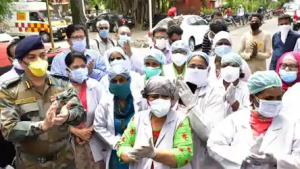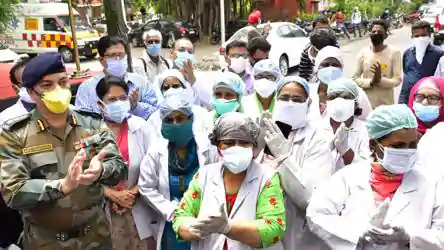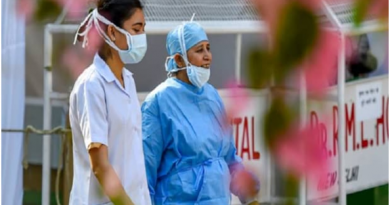Medicare releases guidelines for non-COVID-19 care
Medicare releases guidelines for non-COVID-19 care

Hospitals in states that have reached phase 1 of the administration’s reopening plan can begin providing non-COVID-19 care that has been postponed since the outbreak of the corona virus pandemic, Medicare officials announced late Sunday.
For areas that have fulfilled the federal recommendations to begin phasing in a relaxation of the restrictions designed to slow the spread of the corona virus, the Centers for Medicare and Medicaid Services (CMS) has issued a set of guidelines for how hospitals can begin to offer medical care not associated with COVID-19.
In March, CMS asked hospitals to stop providing elective surgeries and other procedures not related to the corona virus to avoid strain on the health care system. The suspension resulted in outpatient surgical facilities mostly being shut down.
“As states and localities begin to stabilize, it is important to restart care that is currently being postponed,” CMS said in its announcement. The guidance applies to some elective procedures, care for chronic diseases and some preventive care. CMS also encouraged patients and providers to continue to use telehealth wherever possible, but noted that some medical care must be provided in person.
“We are providing a road map for providers to offer some forms of non-corona virus-related care to asymptomatic patients,” CMS Administrator Seema Verma said Monday on a conference call with reporters. “These are recommendations, and every state and local officials will need to assess the situation on the ground to determine the best course forward,” including that they have the equipment and supplies necessary to handle the non-virus care, she added.
CMS says hospitals that have adequate facilities and staff to handle non-virus care should establish non-COVID care zones to treat patients for conditions not related to COVID-19, the disease caused by the new corona virus.
Guidelines for providing this care include :
- Staff working in the non-COVID-19 zone should be continually screened for the virus.
- Staff should wear surgical masks and patients should wear a cloth face covering at all times.
- Patients should be screened for potential symptoms of COVID-19 before entering the non-COVID zone and, when possible, patients should be tested before getting care in that zone.
- Staff who work in the non-COVID zone should not also treat patients with corona virus symptoms.
- Hospitals should continue to monitor the incidence of COVID-19 and stop nonessential procedures if there is a surge in the virus.
Testing expanded for shut-ins, nursing homes :
Medicare beneficiaries whose doctors think they should be tested for COVID-19 but who are not able to leave their homes will be able to get test kits brought to them, thanks to the relaxation of federal health system restrictions during the pandemic.
In addition, Medicare will pay for lab companies to collect samples in nursing homes, which house many older Americans.
“We hope that this will encourage more testing of our nursing home residents, who are among the most vulnerable,” Verma said on a call with reporters Monday night. “We know that over 150 nursing homes have been affected. By increasing testing, we can isolate those patients that have been impacted and keep other residents healthy.”
CMS had earlier announced an expansion of telehealth services, but Verma said those rules are being relaxed even more. Virtual emergency room visits will now be allowed and doctors will be paid for clinical phone calls with their patients, something designed to eliminate any issues Medicare enrollees might have accessing the technology used in more traditional telehealth services. CMS is also expanding the use of telehealth for inpatient rehabilitation, hospice care and home health, Verma said.
Under the relaxed regulations, hospitals will, for example, be able to move patients to alternative sites — such as tented operations, dormitories and outpatient centers — to make room in main hospitals for COVID-19 patients. Rules regarding the ability of hospitals to hire local physicians and other health professionals to meet the surging demand are also being temporarily suspended.



